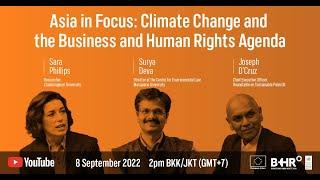
https://www.youtube.com/playlist?list=PL52tsHwSu1Rttrqv4cCYZNMhhOMdYSRyd
https://www.addevent.com/event/LQ14809219
https://www.undp.org/asia-pacific/bizhumanrights
Concern is growing rapidly on the impact of climate change on people and the planet. We need to ask hard questions that involve painful trade-offs. Are current approaches up to the task? What role can the UN Guiding Principles on Business and Human Rights play in framing solutions?
In the upcoming episode on Asia in Focus, we ask:
- What difference will recognition of the right to a clean, healthy, and sustainable environment mean for climate change?
- Are radical or incremental approaches to climate change mitigation needed and who wins and loses under either approach?
- Is mandatory environmental and human rights due diligence a game changer, or a distraction?
- What more can be done to ensure sustainability in palm oil and other industries heavily implicated in driving climate change processes?
This episode complements an upcoming report on climate change exploring solutions and recommendations inspired by the UN Guiding Principles on Business and Human Rights.
Join us for a conversation with experts and industry leaders:
- Prof. Surya Deva, Macquarie University
- Sara K. Phillips, Chulalongkorn University
- Joseph (JD) D'Cruz, Roundtable on Sustainable Palm Oil
UNDP's Business and Human Rights Programme is supporting governments in the development and implementation of National Action Plans on Business and Human Rights. UNDP also works with civil society, providing grants to organizations in the region in support of human rights defenders. UNDP’s work with businesses includes developing due diligence tools, conducting training for staff, and supporting impact assessments.










Add new comment